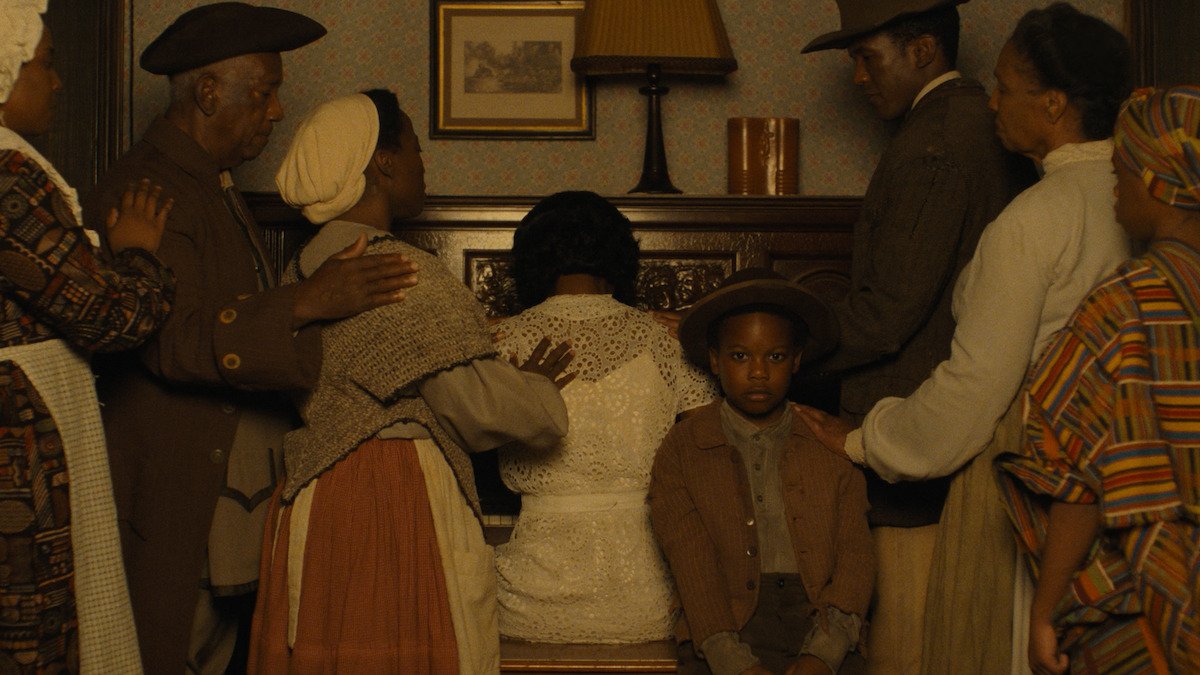THE PIANO LESSON
Directing: B+
Acting: B+
Writing: B+
Cinematography: B
Editing: B
The Piano Lesson is the third August Wilson play to be adapted to film in the past eight years, the others being Fences (2016) and Ma Rainey’s Black Bottom (2020). As with the others, this one is both compelling and feels very much like a filmed stage play. If you didn’t already know it was such an adaptation, you might sit through its almost exclusive scenes of characters in rooms talking and think: Was this a play?
This is always what makes film adaptations of stage plays tricky. On the one hand, watching a story like this is certainly more effective when scene unfold live on stage. On the other hand, film certainly reaches far more audiences. How much more is perhaps the most pertinent question: film adaptations of plays don’t tend to be huge hits, although sometimes (as with Fences) they do go on to gain Academy Awards recognition.
The Piano Lesson is currently in limited release, showing here in the Seattle area only at the Landmark Crest Cinema, up in Shoreline. This is a Netflix production, and as is typical, they have released it in a small number of theaters for Oscar qualification; it will be streaming on Netflix November 22. I can tell you there’s no need to go out of your way to see it in a theater; there is much to admire about this film, but none of it made exceptional by the theatrical viewing experience rather than simply watching it at home.
Although the titular piano plays prominently in the plot, there is surprisingly little piano actually played in this movie. It’s much more about what the object itself represents, as a sort of family heirloom, with lore attached to it that dates back to slavery times: the ancestors of the present-day family whose story this is are carved into the piano’s wood. In the opening sequence, we see the piano being stolen, on Independence Day in 1911, from the former slave owners who have had the piano for decades. It’s the family etched into the piano who are stealing it, but the story being told focuses much more on the descendants of that family, 25 years later.
I will freely admit getting a bit of a kick out of any movie with an otherwise all-Black cast, where the very few White characters onscreen are either outright evil or merely forgettable and insignificant. Plenty of White dipshits will see this as “wokeness” gone too far. I see it as poetic justice. The fact that August Wilson’s dialogue is reliably poetic is icing on the cake.
The original play was produced in 1987. but there was a revival Broadway production in 2022 and 2023 starring Samuel L. Jackson, John David Washington, Ray Fisher and Michael Potts—all of whom reprise their roles here. Most of the story takes place in the house of Bernice (Danielle Deadwyler), her daughter Maretha (Skylar Aleece Smith), and her uncle, Doaker (Jackson), which is slowly revealed to be haunted by James Sutter (Jay Peterson), the patriarch of the aforementioned slave-owning family. Bernice gets paid a visit by her brother, Boy Willie (Washington), and his friend Lymon (Ray Fisher). A couple of other visitors wind up showing up: Wining Boy Charles (Michael Potts), Bernice’s other uncle and Doaker’s brother; and Avery (Corey Hawkins), an old family friend, now turned preacher, who has aims to marry a very resistant Bernice.
A huge amount of the dialogue consists of Bernice and her brother Boy Willie arguing over the piano. Boy Willie has come to Pittsburgh with a truck load of watermelons he intends to sell, and then buy land with funds combined with the sale of the piano. This is actually a rich and compelling argument to witness, because both characters have valid points of view on the matter. Boy Willie believes their forefathers would want the piano to be used to make their lives better and more secure, being worth enough to help make that happen. Bernice believes far too much love and sacrifice went into the carvings to cast it aside as a family heirloom. I think I’m with Bernice on this one, but it’s not difficult to understand Boy Willie’s opinion on the matter.
The Piano Lesson is directed by first-time feature film director Malcolm Washington—John David’s brother and also son of Denzel—and he holds his own fairly impressively, creating an adaptation about as successful as the other two from recent years. It’s the supernatural element where your mileage may vary: this one has a legit ghost, and a preacher who comes to throw holy water around and attempt to cast out the spirit. It’s like August Wilson suddenly gained a strain of The Exorcist—albeit one far more subtle than that comparison might suggest.
This also allows for a lot of myth and allegory, of course, particularly when it comes to generational trauma. For me, The Piano Lesson mostly works, and the challenge lay less with the content itself than with adaptation across mediums. Once you can cross that hurdle as a viewer, this is a film that succeeds just by sticking with you.
A lesson is conveyed by ancestors.
Overall: B+

